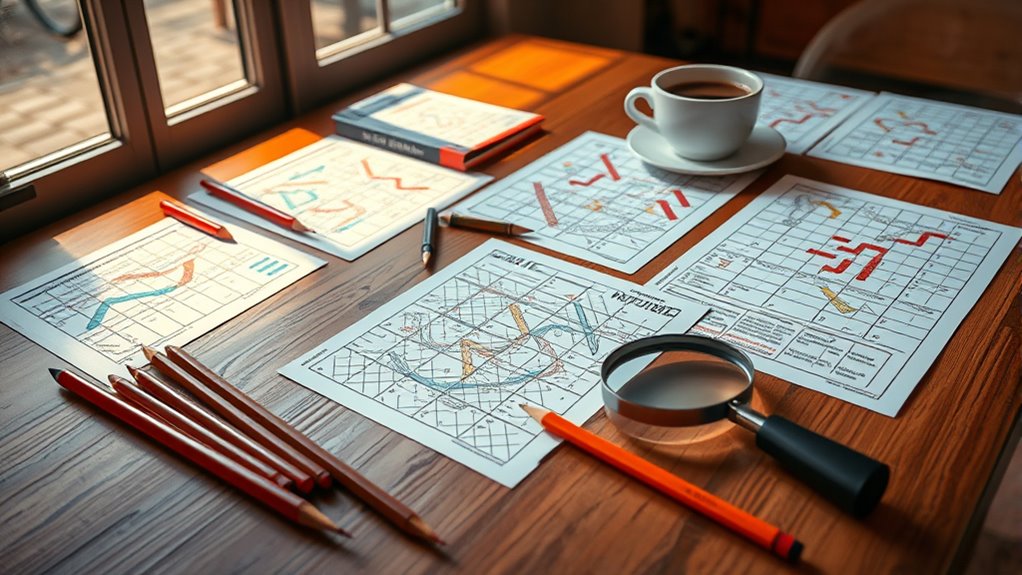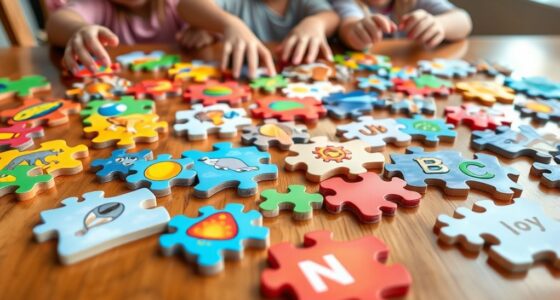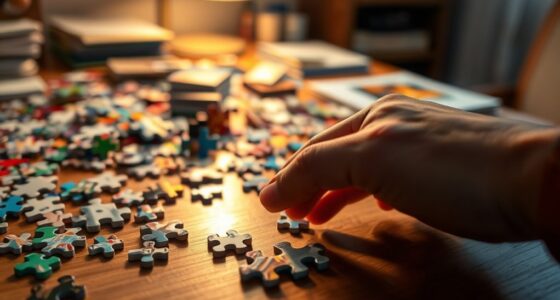Logic puzzles are engaging brain teasers that challenge you to analyze clues, identify patterns, and draw logical conclusions to solve problems. They come in various types, like deduction puzzles, pattern recognition, and spatial challenges, helping boost your reasoning and problem-solving skills. Approaching them with a systematic plan and strategies can make solving easier and more enjoyable. Keep exploring, and you’ll uncover more techniques to sharpen your thinking and have fun at the same time.
Key Takeaways
- Logic puzzles are brain teasers that challenge critical thinking, pattern recognition, and deductive reasoning skills.
- They come in various forms, including deductive puzzles, pattern challenges, and spatial or visual puzzles.
- Solving logic puzzles enhances cognitive abilities, concentration, problem-solving skills, and mental persistence.
- Effective strategies involve systematic organization, breaking down problems, and logical elimination of possibilities.
- Popular examples include Sudoku, the Zebra Puzzle, and Knights and Knaves puzzles, which have cultural and educational significance.
What Are Logic Puzzles?
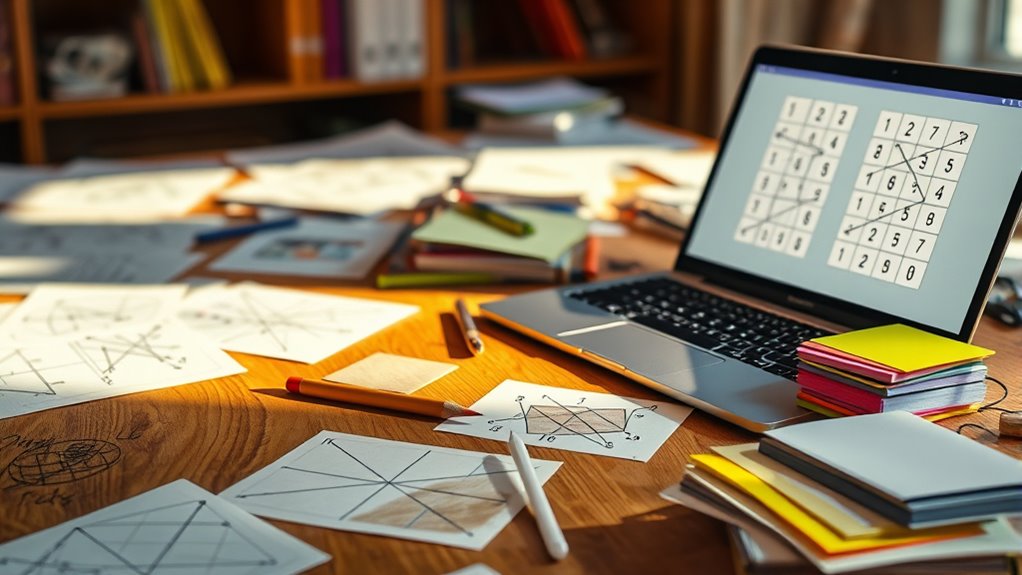
Have you ever wondered what makes a puzzle truly “logical”? Logic puzzles are brain teasers that challenge you to think critically and systematically. They require you to analyze clues, recognize patterns, and draw conclusions based on evidence. Unlike straightforward riddles, these puzzles often demand lateral thinking—approaching problems from different angles to find solutions. You’ll find yourself connecting dots, eliminating impossible options, and making deductions. The beauty of logic puzzles lies in their ability to sharpen your reasoning skills while keeping you engaged. They’re perfect for exercising your brain, pushing your limits, and honing your problem-solving abilities. Understanding problem-solving techniques can further enhance your ability to solve complex puzzles. Whether simple or complex, logic puzzles stimulate your mind and reward your persistence with satisfying solutions.
Types of Logic Puzzles

There are several types of logic puzzles you’ll encounter, each testing different skills. Deductive reasoning puzzles challenge you to draw conclusions from clues, while pattern recognition challenges require spotting trends and connections. Spatial and visual puzzles push you to interpret diagrams and images to find solutions quickly. Additionally, understanding Halloween traditions can help in creating themed puzzles that add an extra layer of interest for enthusiasts.
Deductive Reasoning Puzzles
Deductive reasoning puzzles challenge you to draw specific conclusions from a set of given clues. These puzzles have a rich history overview, dating back to ancient civilizations like the Greeks and Chinese, who used logic games to teach reasoning skills. Their cultural impact is significant, influencing education and entertainment worldwide. To deepen your understanding, consider these aspects: 1. Origin and evolution of deductive puzzles 2. Famous examples like Sudoku and logic grid puzzles 3. How they develop critical thinking and problem-solving skills 4. Their influence on modern puzzle design and culture and their connection to early logic games].
Pattern Recognition Challenges
Pattern recognition challenges are a fascinating category of logic puzzles that test your ability to identify sequences, arrangements, and underlying rules within sets of data. You analyze pattern sequences, looking for consistent changes or repetitions that reveal the logic behind them. Visual cues play a pivotal role, guiding you to notice subtle differences or similarities in shapes, colors, or positions. These puzzles challenge your observational skills and logical thinking, requiring you to connect the dots and predict what comes next. By recognizing the patterns, you can solve the puzzle efficiently and accurately. Whether it’s a sequence of numbers, symbols, or images, pattern recognition helps sharpen your mind and enhances your problem-solving abilities. These challenges are a fun way to exercise your analytical skills daily. Incorporating pattern recognition into your daily routine can also enhance cognitive skills, promoting mental agility and quick thinking.
Spatial and Visual Puzzles
Have you ever tried solving a puzzle that requires you to visualize how shapes fit together or steer through a complex image? Spatial and visual puzzles challenge your visual spatial skills and mental mapping techniques. These puzzles include tasks like fitting pieces together, navigating mazes, or imagining how objects move in space. They help improve your ability to interpret spatial relationships and enhance problem-solving skills. To master them, focus on:
- Developing your mental mapping techniques by visualizing steps beforehand.
- Practicing with different puzzle types to strengthen flexibility.
- Using visual cues to understand how pieces or images relate.
- Improving your spatial awareness through regular mental exercises.
- Understanding how contrast ratio affects image quality and perception, which can help you better interpret visual information during puzzles.
Tackling these puzzles sharpens your cognitive abilities, making you better at visualizing solutions and navigating complex images efficiently.
Basic Principles of Logical Thinking
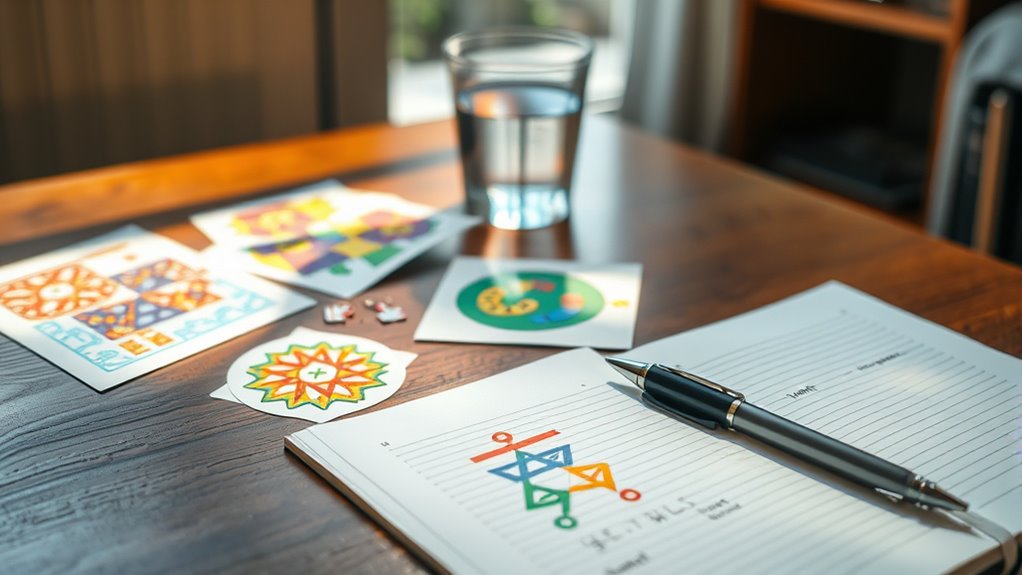
To improve your logical thinking, you need to recognize patterns and understand how they connect. Using deductive reasoning helps you draw solid conclusions from available clues. Be aware of cognitive biases that can mislead your judgment and hinder clear, logical analysis. Additionally, applying organizational strategies can help structure your thought process for better clarity and decision-making.
Identifying Logical Patterns
Understanding how to identify logical patterns is essential for solving puzzles and making sense of complex information. Pattern analysis and sequence detection help you recognize recurring themes and relationships, simplifying problem-solving. Here are key tips to sharpen your skills:
- Look for repetitions or variations in data.
- Track changes between elements to spot progressions.
- Group similar items to find common traits.
- Test possible patterns by predicting the next step.
- Paying attention to consistent patterns can help you anticipate future elements more accurately.
Deductive Reasoning Strategies
Deductive reasoning is a fundamental strategy in logical thinking that involves drawing specific conclusions from general principles or premises. To improve your reasoning, you can use heuristic techniques, which simplify complex problems and guide your thought process efficiently. These strategies help you focus on relevant information and make logical inferences more effectively. However, be aware of cognitive biases that can distort your judgment, such as confirmation bias or overconfidence, which may lead you astray. By understanding these biases, you can better analyze your reasoning process and avoid errors. Developing strong deductive reasoning skills requires practice, but applying heuristic techniques thoughtfully and remaining aware of cognitive biases will enhance your ability to solve logical puzzles accurately. Additionally, understanding concepts like Fokos can provide further insights into logical structures and reasoning patterns.
Avoiding Cognitive Biases
Cognitive biases can cloud your judgment and lead you away from logical conclusions. To think clearly, you must recognize and avoid common pitfalls like heuristic biases and confirmation bias. These biases cause you to rely on mental shortcuts or favor information that supports your preconceptions. Developing an inquiring mindset helps you stay open to new ideas and prevents complacency in your thinking.
To sharpen your logical thinking, consider these strategies:
- Question your assumptions to prevent heuristic biases from influencing your reasoning.
- Seek out evidence that challenges your beliefs, reducing confirmation bias.
- Take your time analyzing each piece of information without jumping to conclusions.
- Be aware of emotional reactions that might skew your judgment, and stay objective.
How to Approach a Logic Puzzle
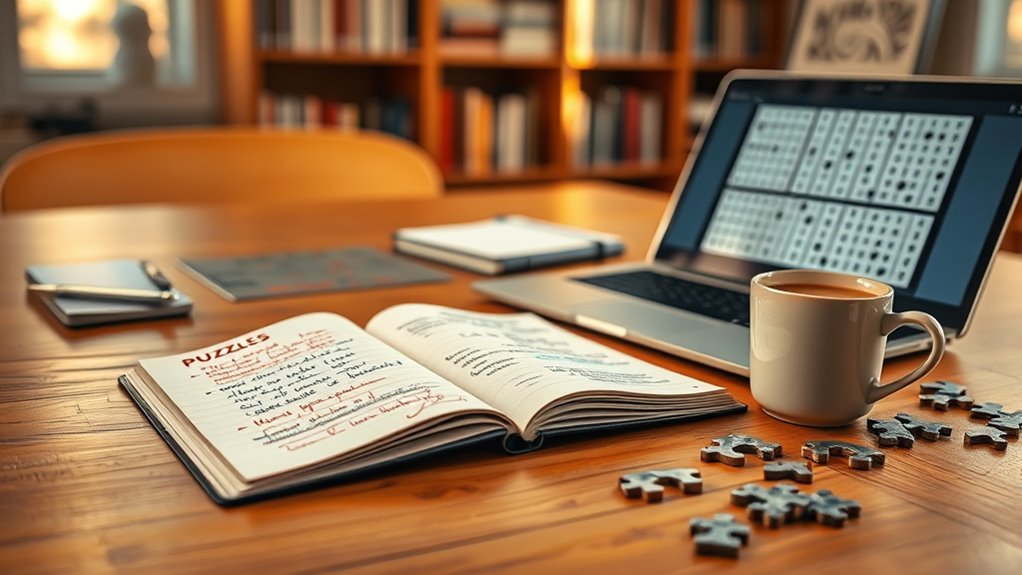
When approaching a logic puzzle, the key is to stay organized and methodical from the start. Begin by using heuristic techniques, which help you make educated guesses and prioritize clues. These techniques speed up your process and prevent you from getting stuck. Next, focus on puzzle categorization—identifying the type of puzzle you’re dealing with, such as Sudoku, grid-based, or matching puzzles. Categorizing helps you apply specific strategies suited to that style, making your approach more efficient. Break down the puzzle into smaller sections, and tackle each part systematically. Keep track of clues and deductions clearly, avoiding guesswork when possible. Staying disciplined and organized from the outset gives you a solid foundation for solving even the trickiest logic puzzles. Additionally, understanding sound vibrations and their effects can enhance your mental focus and clarity during problem-solving.
Common Strategies for Solving
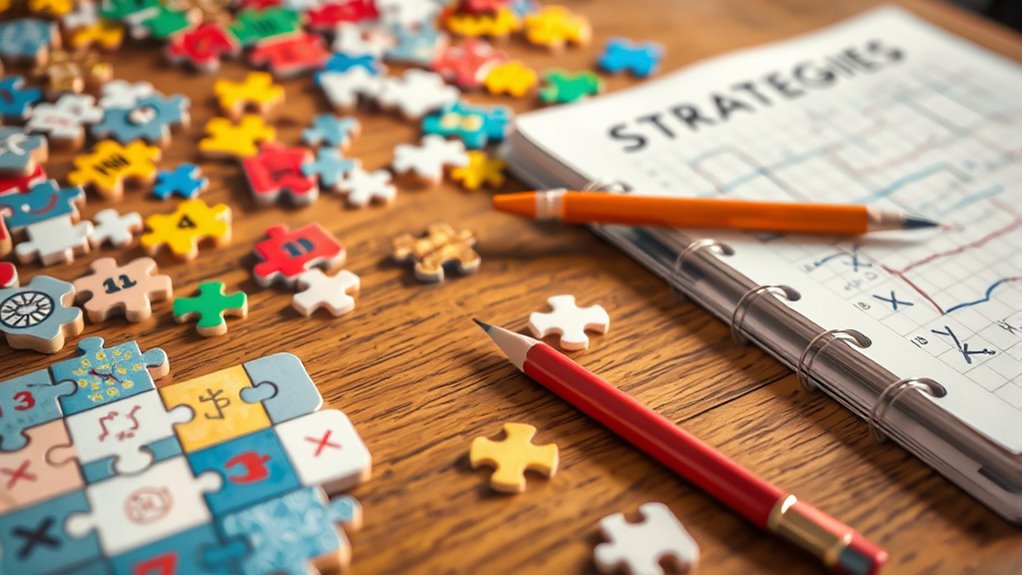
To effectively solve logic puzzles, you should employ a variety of common strategies that streamline your process. These include:
- Using heuristic methods to identify the most promising clues first.
- Making educated guesses based on logical elimination, rather than random trial and error.
- Applying the process of elimination consistently to narrow down possibilities.
- Testing hypotheses by temporarily assuming a fact and checking for contradictions.
Heuristic methods help you focus on key clues, saving time. Trial and error can be useful, but only when guided by logical reasoning. By combining these strategies, you improve your efficiency and accuracy, making complex puzzles more manageable and enjoyable.
Examples of Popular Logic Puzzles
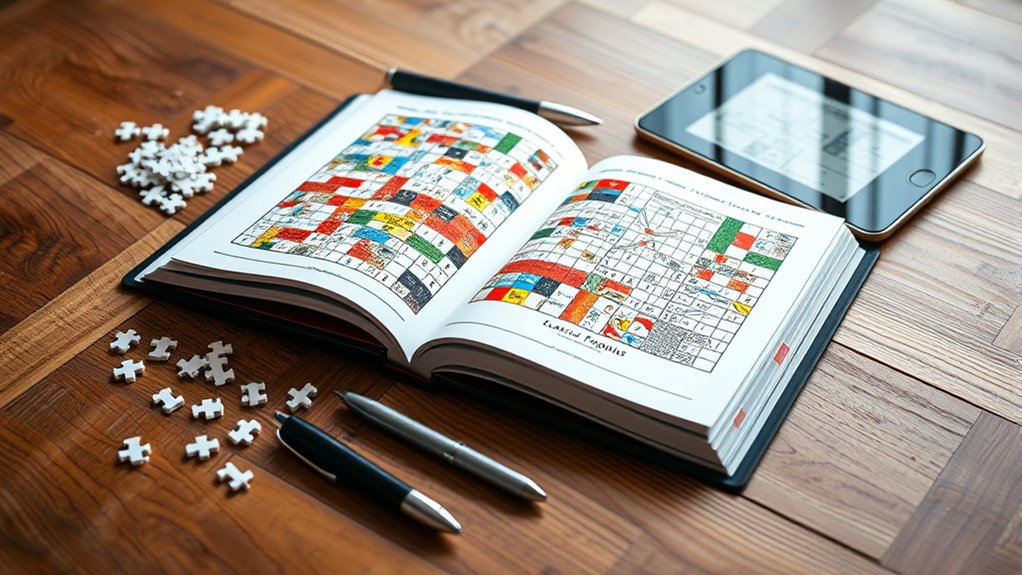
Many popular logic puzzles have captivated enthusiasts for generations, offering engaging challenges that test your reasoning skills. Classic puzzles like Sudoku, where you arrange numbers without repetition, and the Zebra Puzzle, which involves deducing details about different characters, are prime examples. These puzzles often feature character archetypes, such as the detective, the guest, or the owner, helping you visualize relationships and clues more easily. Understanding the puzzle history reveals how they’ve evolved from simple riddles to complex brainteasers enjoyed worldwide. Some, like the Knights and Knaves puzzles, highlight logical contradictions among character archetypes, sharpening your deduction skills. These examples demonstrate the timeless appeal of logic puzzles and how they continue to challenge and entertain across generations.
Benefits of Solving Logic Puzzles
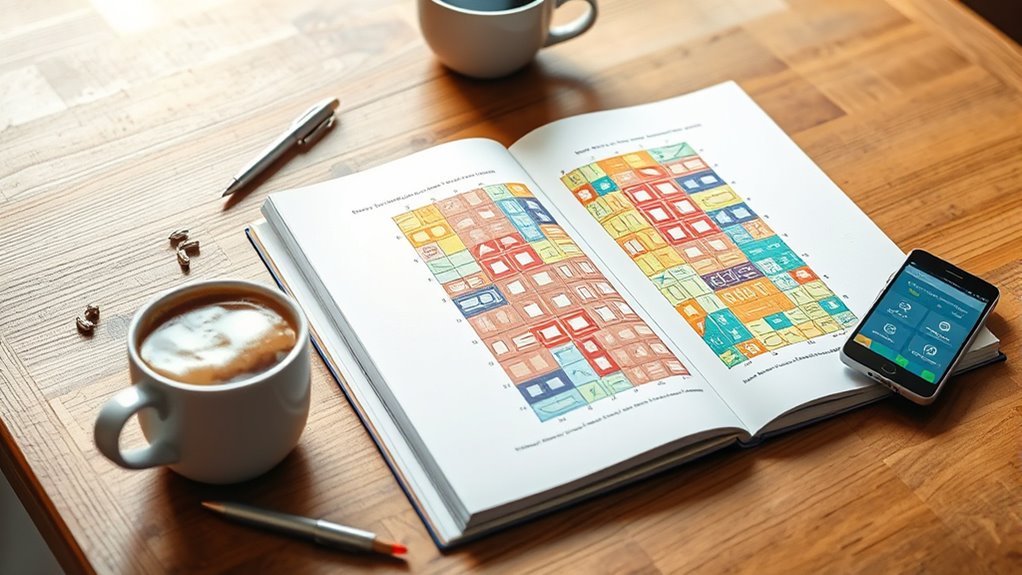
Solving logic puzzles offers a range of mental benefits that can enhance your cognitive abilities. As you work through each puzzle, you’ll notice improvements in focus and mental clarity. Here are some key benefits:
Engaging with logic puzzles boosts focus, sharpens reasoning, and enhances mental clarity for overall cognitive growth.
- Enhances concentration – Staying attentive helps you solve puzzles faster and more accurately.
- Boosts creativity – Finding unique solutions encourages thinking outside the box.
- Sharpens problem-solving skills – Regular practice strengthens your logical reasoning.
- Reduces mental fatigue – Engaging your brain keeps it active and healthy.
Tips to Improve Your Skills
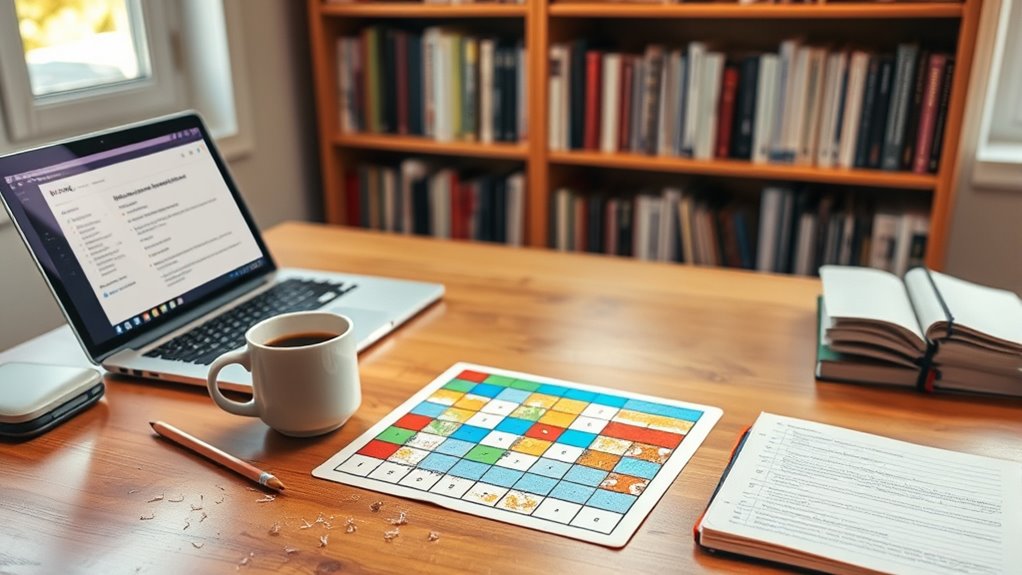
Wondering how to get better at logic puzzles? The key is consistent brain training, which strengthens your reasoning skills and sharpens your logic. Start with puzzles that match your current skill level and gradually increase the puzzle complexity as you improve. This approach helps you build confidence and prevents frustration. Break down complex puzzles into smaller parts to understand the logic step by step, avoiding overwhelm. Practice regularly, focusing on different types of puzzles to expand your problem-solving toolkit. Keep track of your progress to see how your skills develop over time. By challenging yourself with increasingly difficult puzzles and engaging in brain training exercises, you’ll notice steady improvement and a deeper understanding of logic puzzles.
Resources to Find More Puzzles

Are you looking for reliable sources to find more engaging logic puzzles? Luckily, plenty of resources can help you discover new challenges and refine your skills. To deepen your puzzle collection, consider these options:
- Online puzzle websites that regularly update with fresh riddles and logic challenges.
- Books focused on puzzle creation tips and advanced board game strategies, offering both inspiration and difficulty.
- Puzzle forums and communities where enthusiasts share and discuss their favorite puzzles.
- Educational platforms that provide logic exercises designed to sharpen your reasoning skills.
Using these resources, you’ll access diverse puzzle types and gain insights into puzzle creation tips, helping you stay engaged and improve your problem-solving abilities.
Frequently Asked Questions
How Do Logic Puzzles Enhance Cognitive Skills Over Time?
You might wonder how logic puzzles boost your cognitive skills over time. By engaging in brain training through these puzzles, you actively improve your problem solving abilities. Consistent practice challenges your mind to think critically and recognize patterns, strengthening neural connections. Over time, this enhances your logical reasoning, memory, and focus, making you better at tackling complex tasks in daily life. So, solving puzzles truly sharpens your brain skills gradually.
Are There Age-Specific Logic Puzzles Suitable for Children or Seniors?
Imagine you’re in the 21st century, where age-appropriate puzzles exist for everyone. You’ll find senior-friendly riddles that stimulate cognitive skills and children’s logic puzzles designed to be engaging and educational. These puzzles are tailored to suit different cognitive levels, making them perfect for developing problem-solving abilities across ages. Whether for a child or a senior, age-specific logic puzzles help keep the mind sharp and active over time.
What Are Common Mistakes Beginners Make When Starting Out?
When you start solving logic puzzles, you might fall into common misconceptions or beginner pitfalls. Don’t rush through clues or make assumptions without evidence; it’s easy to jump to conclusions. Keep track of all information clearly, and double-check your deductions. Rushing or ignoring details can lead to mistakes. Practice patience and attention to detail, and over time, you’ll develop stronger reasoning skills and avoid these common beginner pitfalls.
Can Logic Puzzles Be Integrated Into Educational Curriculums Effectively?
They say “a little knowledge is a dangerous thing,” but logic puzzles can be a powerful addition to your curriculum. You can effectively integrate them by using innovative pedagogical strategies that promote critical thinking and problem-solving. Incorporate puzzles into lessons, encouraging students to think creatively and develop analytical skills. This approach makes learning engaging and practical, helping students see real-world applications while enriching the overall educational experience.
How Do Cultural Differences Influence the Design of Logic Puzzles?
You should consider how cultural differences influence the design of logic puzzles, especially through cultural symbolism and puzzle accessibility. Recognizing diverse symbols helps guarantee puzzles resonate across cultures, making them more engaging. Additionally, adjusting puzzle complexity and language enhances accessibility for varied audiences. By thoughtfully integrating these elements, you can create logic puzzles that are inclusive, meaningful, and enjoyable for people from different cultural backgrounds.
Conclusion
As you delve into logic puzzles, you might notice surprises in your problem-solving skills—almost like they find you when you least expect it. With each puzzle, you sharpen your mind and open new ways of thinking, often when you’re not even looking. So keep practicing, stay curious, and watch how these puzzles seem to stumble into your day, making every solution feel like a small, satisfying coincidence.
